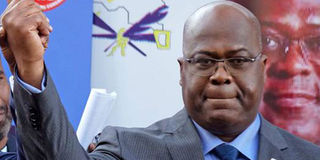EU, AU signal willingness to work with Congo's Tshisekedi

DR Congo president Felix Tshisekedi
What you need to know:
- At stake is political stewardship of the mineral-rich but notoriously unstable central African nation, which has been ruled by strongman Joseph Kabila since 2001.
- Meanwhile, a notorious militia chief has been killed in DR Congo along with six of his men in a military operation in volatile northeastern Ituri province, the army said on Tuesday.
The African Union and the EU on Tuesday signalled their willingness to accept the official results of DR Congo's presidential election, despite bitter protests by the runner-up.
Felix Tshisekedi is expected to be sworn in as president on Thursday after the country's highest court declared him victor -- even though leaked figures suggested his opponent had won.
After talks between EU and AU foreign ministers in Brussels, the African bloc's peace and security commissioner Smail Chergui said his organisation was "ready to work with president Mr Tshisekedi."
The EU's diplomatic chief Federica Mogherini did not give Tshisekedi such explicit backing.
But she said Brussels had "taken note" of the officially-declared results, and she referred to Tshisekedi as the "new president".
"The task now for the new president includes major challenges in several sectors -- on the security, social, economic and governance fronts," Mogherini said.
"We think that all of this requires the president to be a unifier, willing to engage in dialogue both inside the country and abroad... to meet the political and economic aspirations of the people."
In a further sign of the EU's acceptance, the bloc will have an official representative at the inauguration.
The identity and rank of the envoy was not given. On December 27, DR Congo expelled the EU's head of mission, Bart Ouvry, a Belgian national, after the 28-nation bloc reimposed sanctions on 14 officials over a brutal crackdown on protest.
The ceremony will come after three weeks of growing tension over the long and drawn-out counting process after the December 30 vote.
After Tshisekedi was provisionally declared winner, his main rival Martin Fayulu appealed, but the Constitutional Court ruled against him.
At stake is political stewardship of the mineral-rich but notoriously unstable central African nation, which has been ruled by strongman Joseph Kabila since 2001.
Tshisekedi's investiture will mark the country's first peaceful handover of power since independence from Belgium in 1960.
Meanwhile, a notorious militia chief has been killed in DR Congo along with six of his men in a military operation in volatile northeastern Ituri province, the army said on Tuesday.
The operation took place as the country prepares to swear in Felix Tshisekedi as its new president following a disputed election that will see Joseph Kabila step down after 18 years in power.
"We attacked a Mai-Mai Simba position overnight, and neutralised seven militiamen, including their leader Manu," army spokesman Lieutenant Jules Tshikudi in Ituri province told AFP.
The incident happened in the town of Pembele in Mambasa territory, west of the regional capital Bunia.
Eastern DR Congo is known for its instability, with the government struggling to contain militia violence, tit-for-tat killings and a recent Ebola outbreak that has left more than 400 dead since August last year.
"The people are happy to hear about the death of Manu, a rebel leader who made us suffer," said Mambasa administrator Idris Lokodila, confirming the deaths.
Manu, whose real name is unknown, succeeded Paul Sadala, alias Morgan, whose militia regularly clashed with the Congolese army until he was killed in 2014.
Dozens of armed groups compete for control of eastern DR Congo's vast deposits of minerals, including gold, diamonds, copper and coltan.
The army also said on Tuesday that it had repulsed an assault by attackers on one of its position in Largu, north of Bunia.
A source in local civil society told AFP they had "seen four military corpses" and "nine others in the hospital".



